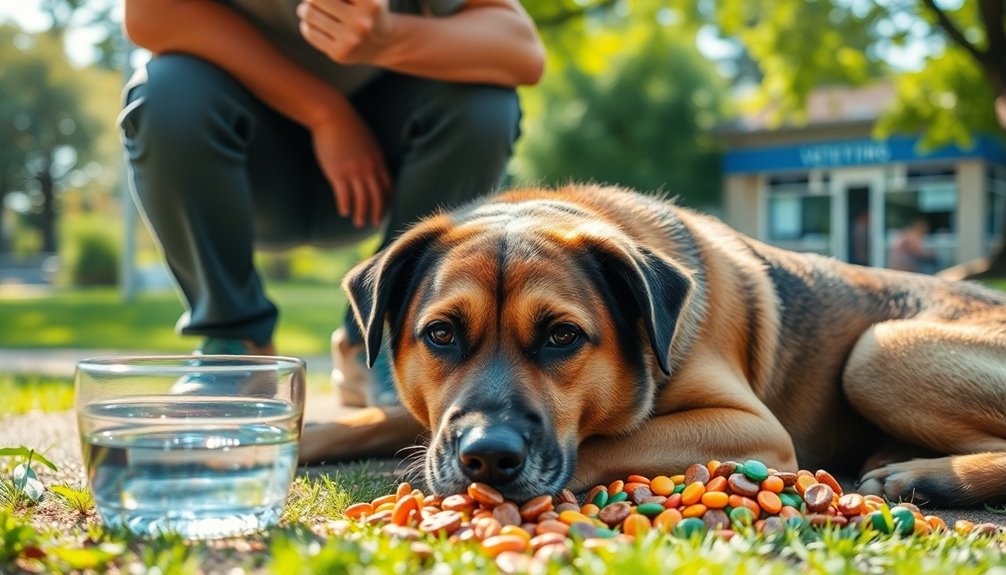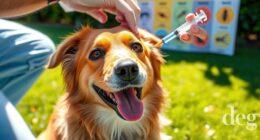Recognizing when your dog is unhealthy can save their life. Look for signs like vomiting, diarrhea, loss of appetite, or weight changes. Notice any changes in urination habits or if they seem more lethargic than usual. Respiratory issues like coughing or wheezing can indicate serious problems. Don't ignore skin irritations or a dull coat. Mobility difficulties, like reluctance to exercise, often signal discomfort. Finally, watch for eye changes, like redness or excessive tearing. If you spot any of these signs, consult a vet promptly; they can guide you on how to help your furry friend feel better. Explore more tips to guarantee your dog's health!
Key Takeaways
- Persistent Vomiting or Diarrhea: Frequent gastrointestinal issues may indicate infections or dietary problems; consult a vet if symptoms last over 24 hours.
- Changes in Urination Habits: Increased or decreased urination can signal serious health concerns; monitor patterns and seek veterinary evaluation for abnormalities.
- Sudden Loss of Appetite: A sudden refusal to eat for more than a day warrants veterinary attention, especially if accompanied by lethargy or vomiting.
- Mobility Issues: Reluctance to play or difficulty moving can indicate joint problems; maintain a healthy weight and consult a vet for persistent stiffness.
- Skin and Coat Problems: Dull fur, excessive itching, or skin irritations may indicate allergies or infections; regular grooming helps identify issues early for treatment.
Vomiting or Diarrhea

When your dog experiences vomiting or diarrhea, it can be alarming, especially if it happens repeatedly. While a single episode mightn't be a cause for concern, multiple occurrences should prompt a vet visit to verify your dog's health isn't at risk.
Various factors can trigger these gastrointestinal issues, such as dietary changes, infections, or even foreign objects they might've ingested.
It's essential to monitor how often your dog vomits or has diarrhea. Frequent vomiting can lead to dehydration, a serious condition, particularly in small or young dogs. If your dog shows signs of weakness or lack of appetite, seek immediate veterinary care.
A bland diet of boiled chicken and rice often helps during recovery, but if symptoms persist, don't wait—contact your vet.
Pay attention to any unusual signs like blood in vomit or feces. These require urgent attention, as they could indicate more serious underlying conditions.
Keeping a record of your dog's eating habits and bowel movements can provide valuable insights to your veterinarian, aiding in diagnosis and treatment planning. Taking swift action can make all the difference in your dog's health.
Changes in Urination
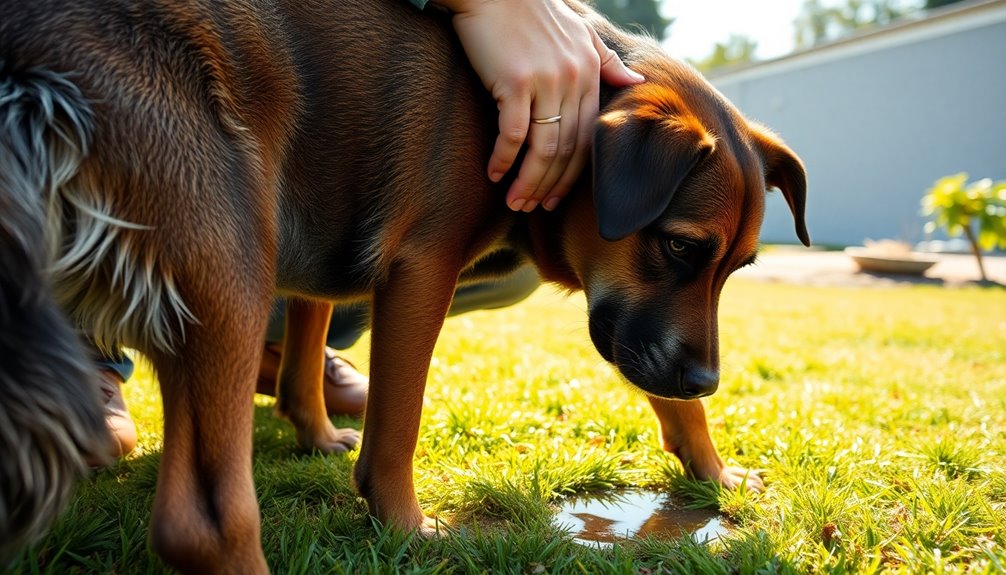
If you notice changes in your dog's urination habits, like increased frequency or decreased volume, it could signal a health issue that needs attention.
Finding blood in your dog's urine is especially concerning and requires immediate veterinary evaluation.
Keeping an eye on these signs can help you catch potential problems early and guarantee your furry friend stays healthy.
Increased Urination Frequency
Increased urination frequency in dogs can signal underlying health issues that shouldn't be ignored. If you notice your dog needing to go out more often, it may indicate conditions like kidney disease or a urinary tract infection.
Keep an eye out for signs of excessive thirst, known as polydipsia, as this can accompany increased urination frequency. Monitoring your dog's water intake and urination patterns closely is essential.
Be vigilant for more serious symptoms, such as straining to urinate, blood in the urine, or accidents in the house. These signs can suggest urinary obstruction or severe infections that require urgent veterinary attention.
Senior dogs are especially vulnerable to these changes, so any sudden shifts in their urination habits should be discussed with your veterinarian to rule out age-related health concerns.
Regularly tracking your dog's urination can aid in early detection of potential health problems. This proactive approach allows for timely veterinary intervention, which can lead to improved outcomes for your furry friend.
Don't hesitate to reach out to your vet if you notice any concerning changes; early action is key to maintaining your dog's health.
Decreased Urination Volume
Changes in your dog's urination habits can reveal important health insights, and decreased urination volume is a significant concern. If you notice your dog is urinating less, it may indicate a serious health issue that requires a vet's attention.
Be vigilant for these signs:
- Less frequent trips outside
- Straining to urinate
- Producing small amounts of urine
- Decreased water intake
A sudden change in urination habits, particularly in senior dogs, should prompt immediate veterinary evaluation.
Even slight decreases in urination can signal underlying problems like kidney disease, diabetes, or urinary tract infections. Monitoring your dog's water intake is essential; if they're drinking less and urinating less, it could point to dehydration or discomfort.
Don't ignore signs like lethargy or loss of appetite accompanying decreased urination volume. These symptoms can be red flags that indicate your dog needs urgent care.
Staying attentive to your dog's health and acting quickly can make a significant difference in their well-being. If you have any concerns, don't hesitate to consult your veterinarian for a thorough assessment.
Blood in Urine
Noticing blood in your dog's urine, also known as hematuria, can be alarming and often signals serious health issues that need immediate veterinary attention. This condition may indicate urinary tract infections, kidney stones, or even bladder cancer.
It's essential to recognize accompanying signs, such as straining to urinate, increased frequency of urination, or signs of pain. Keep a close eye on your dog's behavior, especially if they're a senior, as they're particularly vulnerable to urinary issues.
If you observe blood in your dog's urine, don't wait. Schedule a vet visit as soon as possible. Diagnostic tests like urinalysis and imaging are important for determining the underlying cause of hematuria and guiding appropriate treatment.
Timely intervention can prevent severe complications, including kidney damage or systemic infections, which can arise from untreated urinary issues.
Being proactive about your dog's health is critical. If you notice any sudden changes in urination patterns, it's better to be safe than sorry. Your dog's well-being depends on your vigilance and the prompt action you take when faced with concerning symptoms like blood in urine.
Loss of Appetite
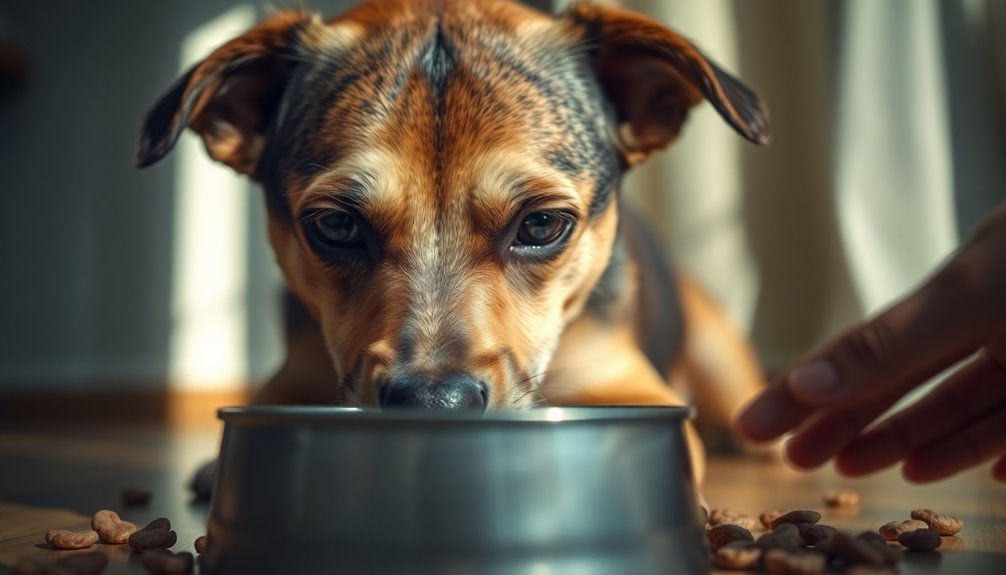
Experiencing a sudden loss of appetite in your dog can be alarming and often signals potential health issues. If your dog refuses to eat for more than 24 hours, it's essential to consult a vet.
Changes in appetite can stem from various causes, including:
- Dental disease
- Gastrointestinal disorders
- Infections
- Stress or anxiety
While you might try offering your dog their favorite treats or warming their food to entice them, a persistent refusal to eat is a red flag.
Pay close attention to any accompanying symptoms, like lethargy, vomiting, or diarrhea. These can indicate a more serious health concern that requires urgent veterinary attention.
Regularly monitoring your dog's eating habits can help you catch changes early. A sudden loss of appetite can be a vital indicator of serious conditions, so don't ignore it.
If you notice this change, make a note of any other symptoms and reach out to your vet promptly. Taking action quickly can make a significant difference in your dog's health and recovery.
Altered Drinking Habits
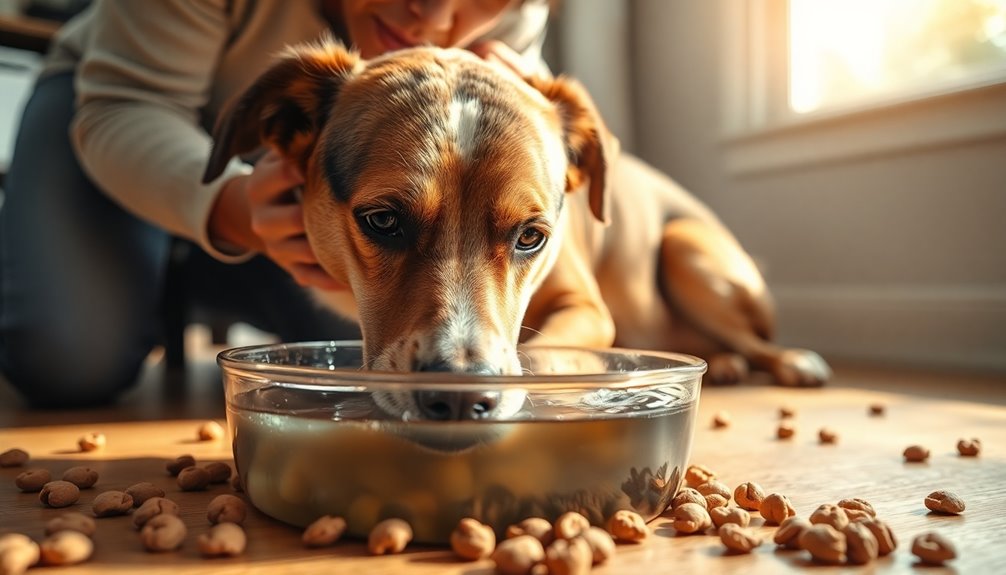
Dogs can sometimes exhibit altered drinking habits that may signal underlying health issues. Sudden increases in your dog's water intake, such as drinking too much water, can indicate serious conditions like diabetes or kidney disease. If you notice your dog drinking more frequently, watch for excessive urination, as this could be a sign of a urinary tract infection that needs veterinary attention.
On the other hand, a decrease in water consumption can also be alarming. If your dog suddenly drinks less than usual, it might indicate dehydration or kidney problems, both of which require prompt veterinary evaluation. Pay attention to signs like straining to urinate or lethargy; these symptoms, when combined with altered drinking habits, should never be ignored.
Additionally, if your dog experiences unexplained weight loss alongside changes in water intake, it's important to seek veterinary care immediately.
Keeping a close eye on your dog's drinking patterns is essential for their overall health. If you notice any concerning changes, don't hesitate to consult your veterinarian for proper diagnosis and treatment.
Weight Fluctuations

Weight fluctuations in your dog can be a sign of underlying health issues, so it's essential to monitor their weight regularly.
Sudden changes, whether gain or loss, may indicate problems that need attention.
If you notice unexplained fluctuations, it's time to seek help from your veterinarian.
Causes of Weight Changes
Monitoring your dog's weight is vital for identifying potential health issues early on. Weight changes can stem from various causes, and recognizing them helps you take action.
Here are some common reasons for weight gain or loss in dogs:
- Overfeeding: Frequent treats or larger portion sizes can lead to weight gain.
- Lack of exercise: A sedentary lifestyle contributes to obesity and weight increase.
- Health conditions: Issues like hypothyroidism or infections can cause sudden weight loss or gain.
- Eating habits: Changes in appetite may point to dental problems or gastrointestinal diseases.
If you notice your dog has lost or gained 10% of their weight, it's important to consult your vet immediately. Sudden changes could indicate serious health issues like cancer or metabolic disorders.
Additionally, monitor your dog's eating habits and maintain consistent feeding routines. This, along with portion control and regular exercise, is key to managing your dog's weight effectively.
Monitoring Weight Regularly
Monitoring weight regularly allows you to spot trends and fluctuations that might indicate underlying issues, such as metabolic disorders or digestive problems. These changes might take weeks to notice, making frequent check-ups and weigh-ins critical for early detection.
It's a good idea to keep a log of your dog's weight over time. This way, you can easily track any significant changes that may require veterinary attention. Additionally, be mindful of certain foods like grapes that can impact your dog's health and weight.
If you notice sudden weight gain or loss, don't ignore it—these could be signs of an unhealthy condition that needs to be addressed. By being proactive and vigilant in monitoring your dog's weight, you can help guarantee they remain healthy and happy for years to come.
When to Seek Help
Being aware of your dog's weight is only the first step; knowing when to seek help is just as important. Fluctuations in weight can be a sign that something is wrong, and being proactive can make all the difference.
Here's when you should reach out to your veterinarian:
- Sudden weight loss of more than 10% of your dog's body weight.
- Small dogs losing as little as 1 pound may need immediate attention.
- Unexplained weight gain, which could indicate obesity, diabetes, or hormonal issues.
- Persistent changes in weight accompanied by lethargy, loss of appetite, or behavioral changes.
Recognizing these signs is vital for dog owners who want to guarantee their pet's health. Regular monitoring allows you to catch any concerning trends early.
If you notice significant fluctuations, don't hesitate to consult your veterinarian. Early intervention can lead to a better prognosis and help maintain your dog's overall well-being.
Behavioral Changes

Behavioral changes in your dog can often be the first indication of underlying health issues that need attention. If you notice significant shifts, like increased aggression or irritability without cause, it's essential to consult a veterinarian. These signs could signal emotional distress or pain.
Withdrawal from family members or other pets, along with excessive barking or whining, may indicate anxiety or discomfort. If your dog starts pacing or shows destructive behavior, it might be experiencing stress or illness, so keep a close watch on these behaviors.
Additionally, reluctance to engage in regular playtime or excessive sleeping throughout the day can be concerning signs of lethargy, which may point to serious health problems.
Unusual behavioral changes, like sudden bursts of hyperactivity followed by fatigue, are also warning signs that warrant a vet visit.
Respiratory Issues

If your dog starts coughing or wheezing, it could signal respiratory issues that need your attention.
Difficulty breathing is a serious warning sign, and understanding common causes can help you seek the right treatment.
Keep an eye on their symptoms, as early detection is key to effective care.
Coughing and Wheezing Symptoms
Coughing and wheezing are often alarming signs that your dog may be facing respiratory issues. These symptoms can indicate respiratory infections, kennel cough, or even serious conditions like heart disease. It's vital to seek a veterinary evaluation promptly for an accurate diagnosis.
Watch for these symptoms that require immediate attention:
- A honking cough, especially in small breeds, which may indicate tracheal collapse.
- Labored breathing or rapid panting, signs of respiratory distress.
- Cyanosis, or blue-tinged gums, which is a serious concern.
- Persistent coughing alongside lethargy, loss of appetite, or fever.
If your dog displays any of these symptoms, don't wait for them to worsen. Early intervention can make a significant difference in treatment outcomes.
Regularly monitor your dog's respiratory patterns and note any changes. Reporting these to your veterinarian can aid in early detection of potential health problems.
Difficulty Breathing Warning Signs
Difficulty breathing in dogs can be a distressing sight for any pet owner. If you notice your dog struggling to breathe, exhibiting labored breathing, wheezing, or persistent coughing, these are significant warning signs indicating potential respiratory issues.
It's important to act quickly, as these symptoms could mean your furry friend is far from a healthy dog. Look out for more severe signs like cyanosis, which appears as blue-tinged gums, or open-mouth breathing. These symptoms signal serious respiratory distress and require immediate veterinary attention.
You should also monitor your dog's breathing rate at rest; a healthy dog typically breathes between 10 to 30 times per minute. If you observe anything outside this range, it's a red flag.
If your dog has a persistent cough, especially if it worsens or is accompanied by lethargy or loss of appetite, don't hesitate to seek veterinary evaluation. Early diagnosis is key to effective treatment.
Common Causes and Treatments
Many respiratory issues in dogs stem from a variety of common causes, each requiring specific treatments. If you notice your dog sick with symptoms like coughing, wheezing, or difficulty breathing, it's essential to understand potential causes. Here are some common ones:
- Infections: Kennel cough is highly contagious and requires prompt veterinary evaluation.
- Allergies: These can lead to sneezing and nasal discharge, often treatable with antihistamines or corticosteroids.
- Chronic Conditions: Issues like bronchitis or collapsing trachea may need long-term management strategies.
- Severe Symptoms: Cyanosis (blue gums) indicates a medical emergency and requires immediate attention.
For your dog's health, seeking medical advice from a veterinarian is critical. They can diagnose the underlying issue and recommend appropriate treatments tailored to your dog's needs.
Early intervention can make a significant difference, especially in cases of serious respiratory distress. Always monitor your pet closely and don't hesitate to reach out to a vet if you notice any concerning signs. Your dog's well-being depends on timely and effective care.
Skin and Coat Problems

When you notice changes in your dog's skin and coat, it's important to pay attention, as these signs can reveal underlying health issues. A healthy dog's coat should be glossy and soft; a dull coat or rough texture may signal dietary issues, allergies, or other health concerns. Skin irritations like rashes, fur loss, and excessive itching could indicate fleas, mites, or allergens in the environment.
Regular grooming can help catch these problems early, so make it a habit. Watch for bald patches, flaky skin, or redness, which may point to skin diseases or nutritional deficiencies. An increase in excessive licking or scratching often means your dog is uncomfortable and needs veterinary attention. Additionally, regular outings for puppy socialization can help support your dog's overall well-being and reduce stress-related skin issues.
Here's a quick reference table to help you identify skin and coat problems:
| Sign | Possible Cause | Action Needed |
|---|---|---|
| Dull coat | Dietary issues or allergies | Improve diet, consult vet |
| Skin irritations | Fleas or environmental allergens | Regular grooming, vet visit |
| Excessive licking | Discomfort or pain | Consult veterinarian |
| Bald patches | Skin disease or deficiency | Schedule a check-up |
Mobility Difficulties

Changes in your dog's skin and coat can often be linked to underlying health issues, and similar attention is needed for mobility difficulties. If you notice your dog showing signs of stiffness, lameness, or having trouble rising, these could be indicators of arthritis, injuries, or infections. Senior dogs are especially susceptible to these problems due to age-related degeneration.
Watch for these signs of mobility difficulties:
- Reluctance to play or engage in walks
- Difficulty getting up from a lying position
- Limping or favoring one leg
- Unusual stiffness after resting
Early intervention is essential. Addressing mobility issues promptly can prevent further deterioration and greatly improve your dog's quality of life.
Additionally, maintaining a healthy weight through a balanced diet and regular exercise can alleviate joint strain, enhancing overall mobility. Incorporating nutrient-rich natural ingredients in your dog's diet, such as those found in freeze-dried raw dog food, can also support joint health.
If you observe any of the signs mentioned, consult your vet for a thorough evaluation. By being proactive, you can help your furry friend remain active and comfortable in their golden years.
Eye Health Concerns
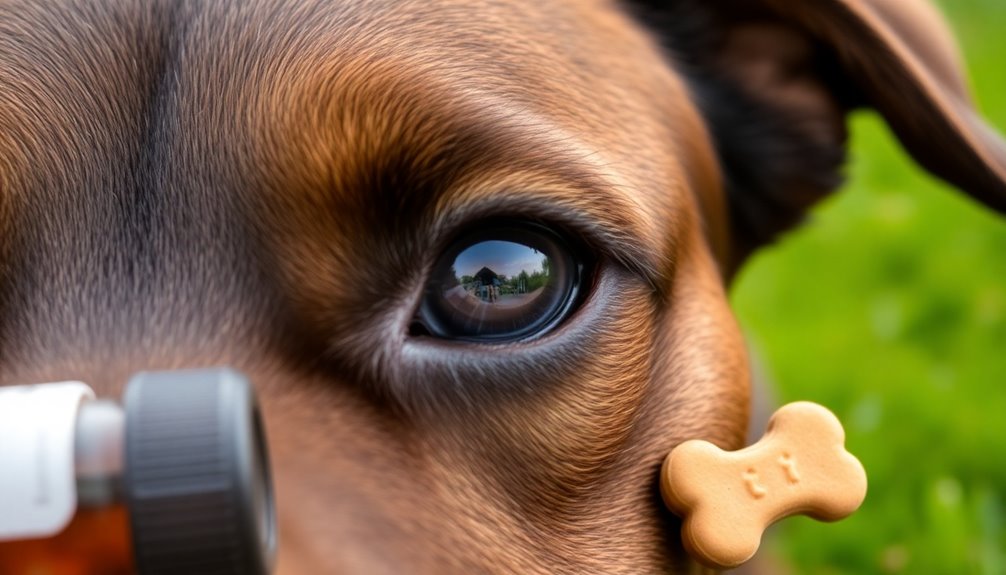
How can you tell if your dog's eyes are healthy? Look for clarity and brightness in their eyes. If you notice cloudy or red eyes, it could signal infections, injuries, or diseases like glaucoma, which need immediate veterinary attention. Signs of eye problems include squinting, excessive tearing, or discharge. Regular eye examinations can help detect early signs of conditions such as cataracts or conjunctivitis, which can severely affect your dog's vision if untreated.
Here's a quick reference table to help you identify common eye issues:
| Signs | Possible Eye Problems | Recommended Action |
|---|---|---|
| Cloudy eyes | Cataracts, glaucoma | Schedule a veterinary appointment |
| Red or swollen eyes | Conjunctivitis, infections | Seek prompt veterinary intervention |
| Excessive tearing | Allergies, foreign body | Have your vet check it out |
| Squinting | Injury, irritation | Get an examination ASAP |
| Discharge | Infections, blocked tear ducts | Contact your vet immediately |
Frequently Asked Questions
How Can You Tell if a Dog Is Unhealthy?
To tell if your dog is unhealthy, watch for changes in appetite; if they skip meals or suddenly start raiding the pantry, it could be a sign.
Notice their thirst—if they're drinking a lot more water and urinating frequently, that's concerning.
Also, check their coat; a rough or dry appearance might indicate issues.
Lethargy or unexplained weight loss should raise red flags.
If you notice any of these, it's time to consult your vet.
How Do I Get My Dog Back Healthy?
Picture your dog joyfully bounding through the yard, tail wagging with excitement.
To get your furry friend back to health, start by scheduling a vet check-up to uncover any hidden issues.
Then, feed them a balanced diet tailored to their needs and guarantee they get at least 30 minutes of exercise daily.
Keep fresh water available and monitor their weight closely.
With your care and attention, they'll soon be that happy, vibrant companion again.
How to Cure a Sick Dog at Home?
To cure a sick dog at home, you should start by closely monitoring their symptoms.
Feed them a bland diet of boiled chicken and rice to help soothe their stomach.
Make sure they stay hydrated by encouraging water intake, or offering ice cubes.
Create a calm, cozy space for them to rest, free from disturbances.
Keep track of any changes in behavior, as this information can be essential if you need to consult a vet.
How Do You Fix a Bad Dog?
To fix a bad dog, start by understanding the root cause of the behavior. You might need to evaluate whether anxiety, lack of socialization, or other factors are at play.
Implement consistent training techniques like positive reinforcement, and guarantee your dog gets ample physical and mental stimulation through regular exercise and interactive play.
Establishing a routine can help create a sense of security, making it easier for your dog to learn good behaviors.
Conclusion
Your dog's health is a delicate balance, and recognizing the signs of trouble can make all the difference. If you notice any of these warning signs, don't wait—take action now. A simple vet visit could uncover hidden issues, or it might just be a minor fix. But what if it's something more serious? The sooner you address these concerns, the better chance your furry friend has at a long, happy life. Don't let uncertainty linger.

